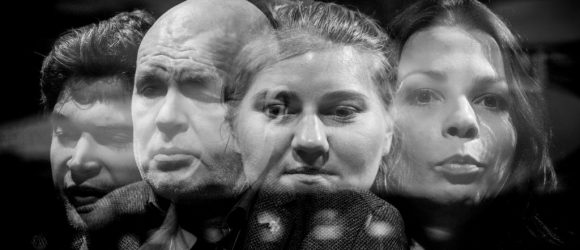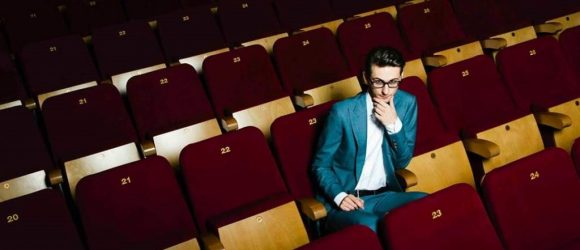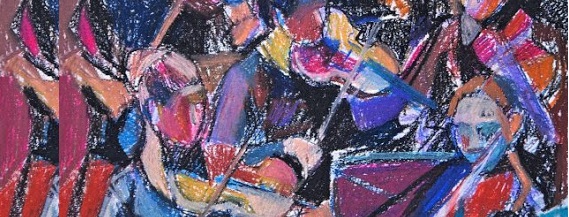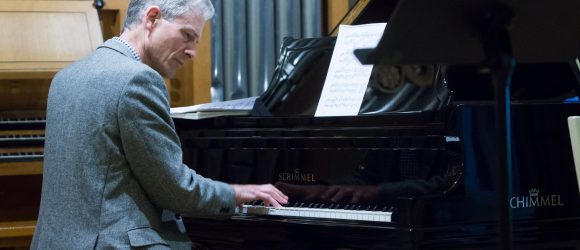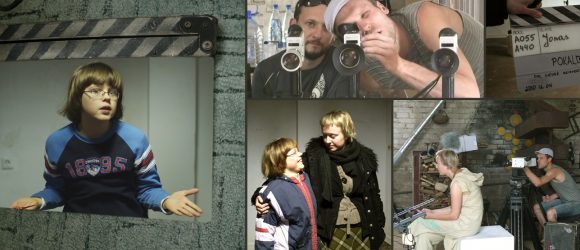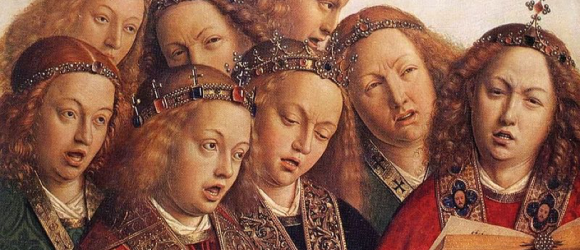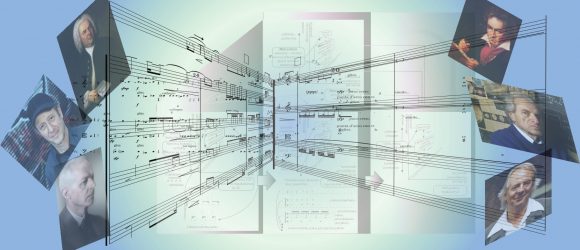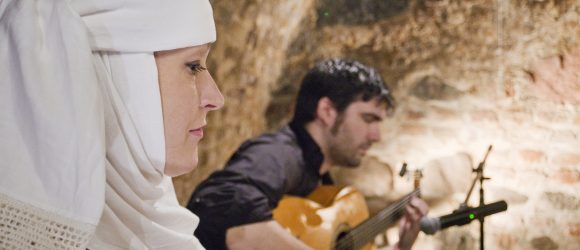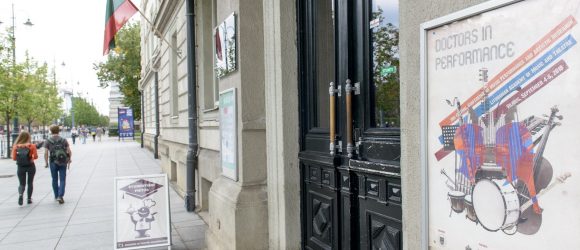Defense of the artistic research project “Documentary Theatre: Creative Methods of Verbatim”
- 2020-12-14
- | News
On December 18–19, 2019, the defense of Loreta Vaskova artistic doctorate project “Documentary Theatre: Creative Methods of Verbatim” will take place at the Lithuanian Academy of Music and Theatre. Artistic Supervisors: Assoc. Prof. Yana Ross, Prof. Dr. Ramunė Marcinkevičiūtė. Copies of the research paper and its summary are available at the library of the Lithuanian Academy of Music and Theatre (Gedimino pr. 42).
Free entrance.
Defense of the creative part of the artistic doctorate project
December 18, 2019, 6 p.m.
LMTA Building 1: Balcony Theatre (Gedimino Ave. 42, Vilnius)
PROGRAM
Documentary Performances
“Personalas”
“Šimtas metų vaikystės”
“Supeherojai”
“Ramybės stotelės”
Defense of the artistic research paper
December 19, 2019, 10 a.m.
LMTA Building 1: Juozas Karosas Hall (Gedimino Ave. 42, Vilnius)
CHAIR OF THE DEFENSE BOARD OF ARTISTIC RESEARCH PROJECT – Prof. Nelė Klimienė-Savičenko
MEMBERS OF THE BOARD:
Prof. Aidas Giniotis (Lithuanian Academy of Music and Theatre)
Assoc. Prof. Zane Kreicberga (Jāzeps Vītols Latvian Academy of Music)
Assoc. Prof. Dr. Ramunė Balevičiūtė-Liugienė (Lithuanian Academy of Music and Theatre)
Prof. Dr. Rasa Vasinauskaitė (Lithuanian Academy of Music and Theatre)
REVIEWERS:
Prof. Darius Meškauskas
Prof. Dr. Aušra Martišiūtė-Linartienė
Abstract
Documentary Theatre: Creative Methods of Verbatim examines verbatim – one of the most popular forms of documentary theatre. To create verbatim performances, theatre directors, actors and dramaturgs use interviews based on a specific subject. This type of performance emerged in 1970’s at the Victoria Theatre, a fringe theatre in England. In the twenty-first century, the definition of verbatim became more flexible and this artistic form began to change. As an example, one can take the use of headphones in acting, or headphone verbatim, as well as verbatim musical.
The scholarship that looks at verbatim theatre fails to thoroughly analyse the diversity of its contemporary forms. As a result, the research object of this doctoral thesis is a selection of contemporary verbatim playtexts, which allows the author of Documentary Theatre: Creative Methods of Verbatim to distinguish and define five main types of verbatim plays: pure, non-pure, mixed, semi-verbatim and quasi-verbatim. These verbatim types are then examined based on performances of Staff (2016) and A Hundred Years of Childhood (2018), both created by the author of this thesis, and her experience during international workshops and internships.
Defense of the artistic research project “The Concept of a Piano School, Its Developement, and the Impact on Contemporary Performance Paradigms”
- 2020-12-14
- | News
On December 11–12, 2019, the defense of Jurgis Aleknavičius artistic doctorate project “The Concept of a Piano School, Its Developement, and the Impact on Contemporary Performance Paradigms” will take place at the Lithuanian Academy of Music and Theatre. Artistic Supervisors: Prof. Jurgis Karnavičius, Prof. Habil. Dr. Leonidas Melnikas. Research consultant: Assoc. Prof. Dr. Lina Navickaitė-Martinelli. Copies of the research paper and its summary are available at the library of the Lithuanian Academy of Music and Theatre (Gedimino pr. 42).
Free entrance.
Defense of the creative part of the artistic doctorate project
December 11, 2019, 7 p.m.
LMTA Building 1: Great Hall (Gedimino Ave. 42, Vilnius)
PROGRAM
Arvo Pärt – Fratres
Wolfgang Amadeus Mozart – String Quartet no. 17 K.458
Sergei Prokofiev – Violin Sonata no. 2 op. 94a
Defense of the artistic research paper
December 12, 2019, 2 p.m.
LMTA Building 1: Juozas Karosas Hall (Gedimino Ave. 42, Vilnius)
CHAIR OF THE DEFENSE BOARD OF ARTISTIC RESEARCH PROJECT – Prof. Rūta Rikterė
MEMBERS OF THE BOARD:
Prof. Birutė Vainiūnaitė
Dr. Julian Hellaby
Prof. Dr. (hp) Gražina Daunoravičienė
Prof. Dr. Audronė Žiūraitytė
REVIEWERS:
Prof. Sergej Okruško
Prof. Dr. Rūta Stanevičiūtė-Kelmickienė
Abstract
A piano school as a historically changing and developing phenomenon whose central figure is a performer, seeking to perceive and convey the creative ideas incorporated in the composer’s musical text through live performance.
In the research of piano schools and it’s impact on the contemporary paradigms the main focus is put on the three main paradigms: the conceptual, vocal, and colouristic. performance paradigms were identified, which accumulated performance practices formed and established by piano schools. The study of these paradigms prompts answers to important questions: On what basis can composition interpretation practices be identified and systematised? What role in the process is played by performer’s personal qualities, the environment, and fashion priorities? Does the pedagogical genealogy make it possible to see the most distinctive features of a piano school? How is the performer’s interpretation affected by the composer’s creative style, country-specific culture, and aesthetic values? The analysis of these aspects provides answers to the main question addressed in the present paper: how and why the above mentioned paradigms of the art of piano performance were formed.
Defense of the artistic research project “Cohesiveness of Performance in Mixed Ensembles”
- 2020-12-14
- | News
On December 11–12, 2019, the defense of Ugnė Antanavičiūtė’s-Kubickienė artistic doctorate project “Cohesiveness of Performance in Mixed Ensembles” will take place at the Lithuanian Academy of Music and Theatre. Artistic Supervisors: Supervisors: Assoc. Prof. Dr. Indrė Baikštytė, Prof. Dr. Rūta Stanevičiūtė-Kelmickienė. Copies of the research paper and its summary are available at the library of the Lithuanian Academy of Music and Theatre (Gedimino pr. 42).
Free entrance.
Defense of the creative part of the artistic doctorate project
December 11, 2019, 5.30 p.m.
LMTA Building 1: Great Hall (Gedimino Ave. 42, Vilnius)
PROGRAM
Carl Reinecke (1824–1910) – Trio for clarinet, viola and piano in A Major op. 264 (1903):
Moderato (Allegro)
Intermezzo (Moderato)
Legende (Andante)
Finale (Allegro moderato)
Ugnė Giedraitytė (b. 1984) – „Au-dessus“ for voice, clarinet and piano (World premiere, 2019)
Leo Smit (1900–1943) – Trio for clarinet, viola and piano (1938)
Sergej Prokofiev (1891–1953) – Overture on Hebrew Themes for clarinet, string quartet and piano in C minor op. 34 (1919)
Defense of the artistic research paper
December 12, 2019, 10 a.m.
LMTA Building 1: Juozas Karosas Hall (Gedimino Ave. 42, Vilnius)
CHAIR OF THE DEFENSE BOARD OF ARTISTIC RESEARCH PROJECT – Prof. Rimantas Armonas
MEMBERS OF THE BOARD:
Prof. Jurgis Karnavičius
Dr. Julian Hellaby
Prof. Dr. (hp) Leonidas Melnikas
Prof. Dr. (hp) Gražina Daunoravičienė
REVIEWERS:
Prof. Audronė Pšibilskienė
Assoc. Prof. Dr. Lina Navickaitė-Martinelli
Abstract
Ugnė Antanavičiūtė-Kubickienė‘s research paper – “Performance Coherence in Mixed Ensembles” – reveals a changing attitude towards an ensemble and highlights performance-related problems associated with the fundamental category of coherence. The problem perspective selected for the development of the research opens up the entire complex of specific performance tasks, obstacles, abilities and possibilities. The paradigm of coherence basically involves all the necessary aspects required both for performance and for the analysis of ensemble playing as well as its assessment. The aim of the research paper is to reveal the specifics and obstacles of a mixed ensemble process as well as the category of ensemble coherence through the analysis of the aspects of expression and synchronisation. The aspects of expression and synchronisation highlight the features of ensemble performance that involve not only expressive performance (sound quality, colour, dynamic diversity, etc.) and vertical ensemble coherence but also the initiative of several people and their possibilities to cooperate, communicate, seek emotional coexistence. The research combined the two components – that of expression and synchronisation – that are rarely analysed together. The interaction of musicology, access to performance studies and artistic research; also, practical experience and practical insights of the research author/pianist/ensemble member were of great significance for the development of the research paper. The research presents an original communication model of ensemble members developed by the author as well as the analysis of its application in practice.
Defense of the artistic research project “Changes in Violonist Functions When Playing Solo or in Ensembles: Aspects of Performance and Communication”
- 2020-12-14
- | News
On December 10–11, 2019, the defense of Giedrė Žarėnaitė’s-Molenaar artistic doctorate project “Changes in Violonist Functions When Playing Solo or in Ensembles: Aspects of Performance and Communication” will take place at the Lithuanian Academy of Music and Theatre. Artistic Supervisors: Prof. Ingrida Armonaitė-Galinienė, Assoc. Prof. Dr. Lina Navickaitė-Martinelli. Research consultant: Assoc. Prof. Dr. Rūta Lipinaitytė-Savickienė. Copies of the research paper and its summary are available at the library of the Lithuanian Academy of Music and Theatre (Gedimino pr. 42).
Free entrance.
Defense of the creative part of the artistic doctorate project
December 10, 2019, 5 p.m.
LMTA Building 1: Great Hall (Gedimino Ave. 42, Vilnius)
PROGRAM
Arvo Pärt – Fratres
Wolfgang Amadeus Mozart – String Quartet no. 17 K.458
Sergei Prokofiev – Violin Sonata no. 2 op. 94a
Defense of the artistic research paper
December 11, 2019, 10 a.m.
LMTA Building 1: Juozas Karosas Hall (Gedimino Ave. 42, Vilnius)
CHAIR OF THE DEFENSE BOARD OF ARTISTIC RESEARCH PROJECT – Prof. Petras Radzevičius
MEMBERS OF THE BOARD:
Prof. Jonas Tankevičius
Dr. Julian Hellaby
Prof. Dr. (hp) Leonidas Melnikas
Prof. Dr. Rima Povilionienė
REVIEWERS:
Assoc. Prof. Gediminas Dačinskas
Prof. Dr. Audronė Žiūraitytė
Abstract
The subject of Giedrė Žarėnaitė-Molenaar’s artistic research paper is “Changes in violinist functions when playing solo or in ensembles: aspects of performance and communication”. The inspiration behind the present research is the fact that playing the violin solo is quite different from playing in ensembles and orchestras. Depending on the composition of the ensemble and the position of the violinist (e.g., in a string quartet), a musician must exploit different aspects of violin playing, taking into account the psychology of ensemble music making. Due to the intertwining of artistic practice and music performance studies with the aspects and research methods of the science of sociology, the present paper represents an example of interdisciplinary artistic research. The aim of the research is to explore the technical, social, and performative characteristics of the professional activity of a violin soloist and an ensemble violinist, and to substantiate the necessity of the violinist’s poly-functionality and of certain psychological knowledge that influence the outcomes of artistic activity.
Julian Hellaby “The Topic of Piano Performance”
- 2019-12-08
- | News
2019 December 10, Tuesday, 13:00
LMTA Building 1: Juozas Karosas Hall (Gedimino Ave. 42, Vilnius)
JULIAN HELLABY (piano), LECTURE-CONCERT “THE TOPIC OF PIANO PERFORMANCE”
Leonard Ratner’s book Classic Music: Expression, Form and Style (1980) pioneered the notion of topics as “subject for musical discourse” and with the appearance of topics, a particular theory of musical meaning was able to gain traction. Thus later writers such as Raymond Monelle (2000, 2006) took this theory down a semiotic path, expanding Ratner’s 18th-century focus to include the Romantic era. In this he has been accompanied by Kofi Agawu (2009) and Janice Dickensheets (2012). Monelle also briefly touched on topics in 20th- and 21st-century music and there has been a small body of writing on the subject of 20th-century composers’ topical use by, amongst others, Walter Frisch (2008) and Johanna Frymoyer (2017).
Nevertheless, the focal period of most topic theory remains the 18th century and, significantly, the very substantial Oxford Handbook of Topic Theory (2014) hardly explores any repertoires outside those of the Classical period, and topic-related performance is only considered in passing – there are just three chapters, largely concerned with the interpretation of Mozart’s music. It is therefore the aim of this talk further to extend the study of topicality by assessing how performance can interact and engage with its perceived presence in a range of styles and periods.
For the pianist, an appreciation of topicality has the capacity to affect interpretative decisions, especially if the topic is not named in a work’s title (e.g. ‘Minuet in G’) but is discovered within the setting of a parent work such as a sonata or a ballade. For example, the identification of a waltz topic in a Chopin Ballade or a hunt topic in a Classical sonata movement provides interpretative insights which can be projected in performance.
The Topic of Piano Performance thus explores the interface between topic and interpretation and features performances by the presenter of music by C. P. E. Bach, Mozart, Chopin, Balakirev and John Ireland. It concludes with a consideration of how topical awareness fits in to a wider view of interpretation and discusses possible performance models.
Julian Hellaby (PhD) studied piano with the distinguished British pianist Denis Matthews and later at London’s Royal Academy of Music. He has performed as solo pianist, concerto soloist and chamber musician in continental Europe, Asia, the Middle East, South Africa and throughout the UK, including recitals in the Wigmore Hall, the Purcell Room and the Curch of St Martin-in-the-Fields. He has taught academic music at Coventry University and London College of Music, and also has extensive experience of piano teaching at all levels, including masterclasses for ABRSM, EPTA and other organisations. He has released several CDs as solo and collaborative pianist. Julian Hellaby is the author of two monographs on the art of music performance, Reading Musical Interpretation (Ashgate, 2009) and The Mid-Twentieth-Century Concert Pianist: An English Experience (Routledge, 2018).
Defense of the artistic research project “Depiction of Children in Cinema: Director’s Aspect”
- 2018-11-22
- | News
On December 4–5, 2018, the defense of Giedrė Beinoriūtė’s artistic doctorate project “Depiction of Children in Cinema: Director’s Aspect” will take place at the Lithuanian Academy of Music and Theatre. Artistic supervisor of the project – Prof. Audrius Stonys, research supervisor – Prof. Dr. Aušra Martišiūtė-Linartienė. Copies of the research paper and its summary are available at the library of the Lithuanian Academy of Music and Theatre (Gedimino pr. 42).
Free entrance.
Defense of the creative part of the artistic doctorate project
December 4, 2018, 7 p.m.
LMTA CINEMA HALL (Aud. 5326, Kosciuškos str. 12, Vilnius)
PROGRAM
Giedrė Beinoriūtė (1976)
Film Breathing into Marble (2018) – 97′
Defense of the artistic research paper
December 5, 2018, 10 a.m.
LMTA ORGAN HALL (Aud. 1316, Gedimino pr. 42, Vilnius)
CHAIR OF THE DEFENSE BOARD OF ARTISTIC RESEARCH PROJECT – Prof. Janina Lapinskaitė (Lithuanian Academy of Music and Theatre, Cinema);
BOARD MEMBERS: Prof. Krzysztof Zanussi (University of Silesia in Katowice, Cinema), Prof. Vytautas Anužis (LMTA, Theatre, Acting), Prof. Dr. Ramunė Marcinkevičiūtė (LMTA, Humanities, Art Research, Theatre Studies), Assoc. Prof. Dr. Nerijus Milerius (Vilnius University, Humanities, Philosophy);
REVIEWERS: Prof. Arūnas Matelis (LMTA, Cinema), Assoc. Prof. Dr. Lina Kaminskaitė-Jančorienė (LMTA, Humanities, History).
Abstract
In the artistic research paper “Depiction of Children in Cinema: Director’s Aspect” the specificity of the depiction of children in cinema from the perspective of director‘s work is analysed. The depiction includes images of children, image creation strategies adopted by film directors and related ethical questions as well as reception problems. The research addresses contemporary Lithuanian documentary and feature films (created from 2001 till 2017) including child actors. Principal material of the research includes films, their reception and interviews with creators. The principal objective of this research – through an analysis of specific instances of the early 21st century Lithuanian films featuring children, to distinguish and actualise the issues pertaining to depiction of children in cinema, to investigate and assess the attitudes towards children reflected in cinema and its reception and to contextualise the author’s own creative works associated with children. The present research paper investigates two key problems: the ethical issues associated with cinematic depiction of children and the images attributed to children in films by Lithuanian directors. Self-reflective analysis of creative process of own film Pokalbiai rimtomis temomis [Conversations on Serious Topics] is also presented.
Defense of the artistic research project “Choir in Catholic Church Liturgy”
- 2018-11-22
- | News
On December 13–14, 2018, the defense of Linas Balandis’ artistic doctorate project “Choir in Catholic Church Liturgy” will take place at the Lithuanian Academy of Music and Theatre. Artistic supervisor of the project – Prof. Povilas Gylys, research supervisor – Assoc. Prof. Dr. Danutė Kalavinskaitė. Copies of the research paper and its summary are available at the library of the Lithuanian Academy of Music and Theatre (Gedimino pr. 42).
Free entrance.
Defense of the creative part of the artistic doctorate project
December 13, 2018, 7 p.m.
CHURCH OF ALL SAINTS (Rūdninkų str. 20/1, Vilnius)
CONCERT PROGRAM
Johann Sebastian Bach (1685–1750) Komm, Jesu, komm, BWV 229 (1684); (basso continuo Povilas Jacunskas)
Сергей Рахманинов (1873–1943) Всенощное бдение 37, (1916): 1st mvt. Приидите, поклонимся, 2nd mvt. Благослови, душа моя solo Nora Petročenko; 9th mvt. Благословен еси Господи
Alfred Schnittke (1934–1998) Three Sacred Hymns for mixed choir (1984)
Vaclovas Augustinas (b. 1959) Taip tebūna. Amen! (2018)
Gintautas Venislovas (b. 1973) Triump, triump (2018)
Donatas Zakaras (b. 1979) Rorate Caeli Desuper, for mixed choir, brass quintet and soloist (2014); solo Ieva Skorubskaitė
Performers: Šiauliai State Chamber Choir “Polifonija” (artistic director and chief conductor Tomas Ambrozaitis).
Defense of the artistic research paper
December 14, 2018, 10 a.m.
LMTA JUOZAS KAROSAS HALL (Gedimino pr. 42, Vilnius)
CHAIR OF THE DEFENSE BOARD OF ARTISTIC RESEARCH PROJECT – Prof. Vaclovas Augustinas (Lithuanian Academy of Music and Theatre, Music, Composition);
BOARD MEMBERS: Prof. Vytautas Miškinis (LMTA, Music, Choir Conducting), Assoc. Prof. Artūras Dambrauskas (Vytautas Magnus University, Music, Choir Conducting), Prof. Dr. (hp) Gražina Daunoravičienė (LMTA, Humanities, Art Research, Musicology), Prof. Dr. Martinš Boiko (Jāzeps Vītols Latvian Academy of Music, Humanities, Art Research, Musicology);
REVIEWERS: Prof. Česlovas Radžiūnas (LMTA, Music, Choir Conducting), Assist. Prof. Dr. Jonas Vilimas (LMTA, Humanities, Art Research, Musicology).
Abstract
The topic of the research paper by Linas Balandis is “Choir in Catholic Church Liturgy.” The work primarily focuses on the development of the choir concept that is reflected in the documents of Catholic Church as well as on its interpretations in the theological and pastoral literature of the end of 20th – the beginning of 21st centuries. The research mainly analyses the opinion on the role of a choir in liturgy of the two groups that have had the greatest impact on church choirs – priests and choir conductors – in order to understand the situation with church music in Lithuania and to see whether the instructions indicated in the documents of Catholic Church have been observed. Often the pieces composed by choirmasters are used in church ceremonies. Therefore, the present research paper is finished with a review of religious/liturgical compositions by Lithuanian choirmasters of the end of 20th – the beginning of the 21st centuries. Some authors compose specifically for church ceremonies, whereas the others, having chosen certain liturgical texts, compose opuses more suitable for concerts. The research concentrates on the difference between such creators, discusses the possibility to employ their compositions in church ceremonies.
Defense of the artistic research project “Projection of the Creativity Phenomenon in Musical Composition”
- 2018-11-22
- | News
On December 12–13, 2018, the defense of Sigitas Mickis’ artistic doctorate project “Projection of the Creativity Phenomenon in Musical Composition” will take place at the Lithuanian Academy of Music and Theatre. Artistic supervisor of the project – Prof. Vaclovas Augustinas, research supervisor – Prof. Dr. (hp) Gražina Daunoravičienė. Copies of the research paper and its summary are available at the library of the Lithuanian Academy of Music and Theatre (Gedimino pr. 42).
Free entrance.
Defense of the creative part of the artistic doctorate project
December 12, 2018, 6 p.m.
MUSIC INNOVATION STUDIES CENTRE (Gedimino pr. 42, Vilnius)
CONCERT PROGRAM
Sigitas Mickis (1969)
Orchestral music Apocalypsis for symphonic orchestra (“When the lightning tears…”) (2018) – 23’
Chamber music Apocalypsis: The crowd (2017) – 6’
Sonic theatre Pilis (2016) – 17’
Choir music Žmogus tamsoje (2016) – 6’
Chamber music Nušvitimas… (2015) – 13’
Defense of the artistic research paper
December 13, 2018, 10 a.m.
JUOZAS KAROSAS HALL (Gedimino pr. 42, Vilnius)
CHAIR OF THE DEFENSE BOARD OF ARTISTIC RESEARCH PROJECT – Prof. Mindaugas Urbaitis (Lithuanian Academy of Music and Theatre, Music, Composition);
BOARD MEMBERS: Prof. Donatas Katkus (LMTA, Music, Performance), Prof. Rytis Mažulis (LMTA, Music, Composition), Prof. Dr. Mārtiņš Boiko (Jāzeps Vītols Latvian Academy of Music), Prof. Dr. Antanas Kučinskas (LMTA, Humanities, Art Research, Musicology);
REVIEWERS: Prof. Dr. Ričardas Kabelis (LMTA, Music, Composition), Assoc. Prof. Dr. Mārtiņš Viļums (LMTA, Humanities, Art Research, Musicology).
Abstract
Artistic research project Projection of the Creativity Phenomenon in Musical Composition conducted by Sigitas Mickis reveals the acoustic structure of compositional gestures of rhythm. The sonic gestures shaped by the composer are investigated based on the most recent cognitive research of music in the 20th-21st centuries, which allows predicting the experience of rhythm compositional gestures when auditioning the music during the compositional process or while listening to performance of already written works. The criteria distinguished by the author assist in identification of creative changes in musical expression – the auditory events modelled in compositional process. The first criterion relies on novelty; for rhythm it is generated through combinatory formation of contour, while for form it is achieved via syntax innovations. The second criterion reveals the quality of acoustic interaction between the auditory expectations and constructive compositional grammars. The third criterion marks the contextuality of the projection of the first two criteria in three-dimensional auditory imagery. The research aims to formulate a consistent theory of multidimensional creativity contexts and compositional actions therein, complementing the practice of musical research and proposing an original method of gesture analysis of creativity. One of the secondary objectives achieved by the research is the formulation of terminology for cognitive creativity analysis.
Defense of the artistic research project “Transformations of the Vocal Timbre: The Influence of Ethnic Traditions’ Practice on the Contemporary Performer”
- 2018-11-21
- | News
On December 5–6, 2018, the defense of Brigita Bublytė’s artistic doctorate project “Transformations of the Vocal Timbre: The Influence of Ethnic Traditions’ Practice on the Contemporary Performer” will take place at the Lithuanian Academy of Music and Theatre. Artistic supervisor of the project – Prof. Nelė Klimienė-Savičenko, research supervisor – Assoc Prof. Dr. Ramunė Balevičiūtė, research consultant – Prof. Habil. Dr. Daiva Vyčinienė. Copies of the research paper and its summary are available at the library of the Lithuanian Academy of Music and Theatre (Gedimino pr. 42).
Free entrance.
Defense of the creative part of the artistic doctorate project
December 5, 2018, 6 p.m.
BALCONY THEATRE (Gedimino pr. 42, Vilnius)
PROGRAM
Documentary film Sutarmenko (2016, dir. Armas Rudaitis) – 50′
Screening of the performance Circle of Rasas (2016) – 13′ (short version)
Exhibition of Brigita Bublytė’s research-based schemes Visualisations of Voice Expression
Defense of the artistic research paper
December 6, 2018, 10 a.m.
JUOZAS KAROSAS HALL (Gedimino pr. 42, Vilnius)
CHAIR OF THE DEFENSE BOARD OF ARTISTIC RESEARCH PROJECT – Prof. Vytautas Anužis (Lithuanian Academy of Music and Theatre, Theatre, Acting);
BOARD MEMBERS: Prof. Aidas Giniotis (LMTA, Theatre, Directing), Prof. Asta Krikščiūnaitė (LMTA, Music, Singing), Prof. Dr. Aušra Martišiūtė-Linartienė (LMTA, Humanities, Philogogy), Prof. Dr. Valdis Muktupavels (Latvian University, Humanities, Art Research);
REVIEWERS: Assoc. Prof. Dr. Ramūnas Motiekaitis (LMTA, Music, Composition), Prof. Dr. Rasa Vasinauskaitė (LMTA, Humanities, Theatre Studies).
Abstract
Transformations of the Vocal Timbre: The Influence of Ethnic Traditions’ Practice on the Contemporary Performer is an interdisciplinary artistic research paper primarily orientated towards a professional contemporary stage performer – actor, singer or performance artist. However, due to the interconnectedness and communication between different areas in the world of contemporary arts as well as the vocal expression entering the spheres of contemporary dance, visual art and poetry, this research will also be of interest to the professionals and non-professionals of other artistic fields. The main subject of the research is the contemporary performer who seeks to embody his or her creative ideas with and through the voice, and who currently experiences the problems caused by the processes of standardisation, such as a need for originality and similar. The thesis suggests that the solution to these problems lies in rethinking how the contemporary performer can help revive ethnic traditions. The contemporary artist and contemporary folklorist live and create at the same time and in the same sociocultural space, very close to each other, which makes their encounter unavoidable. So, what kind of communication between them would ensue? While delineating the principles of vocal communication between the ethnic traditions and the contemporary performer, the aim of this research is to investigate how the interplay between the vocal traditions of different ethnic groups is capable of widening the possibilities of the vocal expression in the contemporary performer. The first chapter of the thesis discerns and discusses the shared vocal expression categories of the ethnic and contemporary performer, and introduces the transformations of the vocal timbre as their common denominator. It also categorises the levels of vocal expression and its training into: a) The Voice and I: Speaking-Singing Subject; b) The Voice and the Other: Variation and Improvisation; c) The Voice and the Environment: Vocal Technique and Interpretation. The following chapters of the thesis are structured according to these categories and offer the practical aspects of the vocal expression: they focus on the voice as an instrument and highlight the common principles of the vocal expression; building on the theoretically analysed discourses of the vocal expression as well as the empirical experience of the author, discuss the practice of sounding and performing the vocal timbre variations of selected ethnic vocal traditions – flamenco, throat singing and sutartinės; and consider how contemporary performers can apply the knowledge and practice of the vocal timbre transformations in their creative practice.
Photo by Dmitrijus Matvejevas
The 3rd “Doctors in Performance” festival conference reached a high note
- 2018-09-26
- | News
On September 4–6, 2018, the third “Doctors in Performance” festival conference of music performance and artistic research welcomed artist-researchers from all over the world to the Lithuanian Academy of Music and Theatre.
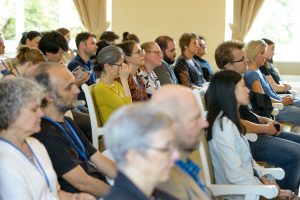
DIP 2018, Opening ceremony
“Doctors in Performance” is a festival conference where music performers conducting artistic research at doctoral and post-doctoral levels present their artistic research in the form of recitals, concert lectures or paper presentations. The first “Doctors in Performance” festival conference was held at the Sibelius Academy of the University of the Arts Helsinki on September 4–5, 2014. The second edition took place at the Royal Irish Academy of Music (RIAM), Dublin, on September 8–9, 2016.
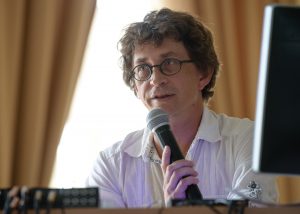
Vykintas Baltakas
Lithuanian Academy of Music and Theatre hosted “Doctors in Performance 2018” in Vilnius, the event being particularly varied in terms of geography of participants. Artist-researchers from 22 countries took part in DIP this year: Latvia, Ireland, Finland, Belgium, Italy, Australia, The Netherlands, United Kingdom, Switzerland, Estonia, Norway, Catalonia, Sweden, Poland, Hungary, Austria, Brazil, Serbia, France, South Africa, and Malaysia. Eleven participants represented the hosting body, Lithuanian Academy of Music and Theatre. On September 4 and 5 respectively, keynote lectures were delivered by one of the major figures in music performance studies, musicologist and pianist Prof. Dr. John Rink (University of Cambridge) and the Lithuanian composer and conductor, founder of the Lithuanian Ensemble Network Prof. Vykintas Baltakas (Lithuanian Academy of Music and Theatre, Maastricht Academy of Music). 72 recitals, lecture-recitals and paper presentations of researchers into musical performance were delivered during the 24 sessions of DIP 2018. Nearly half of the participants hold a PhD or Doctor of Arts degree, the remaining ones are currently doctoral students.
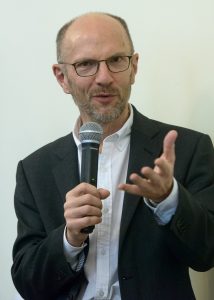
John Rink
“Doctors in Performance 2018” was organised by HARPS, Hub for Artistic Research and Performance Studies at the Lithuanian Academy of Music and Theatre (lead by Assoc. Prof. Dr. Lina Navickaitė-Martinelli). Of crucial importance was the collaboration with major institutions and communities carrying out artistic, or practice-based research and music performance studies. Representatives from Cambridge University (UK), Orpheus Institute in Ghent, Antwerp Conservatoire (Belgium), Catalonia College of Music (ESMUC), artistic doctorate schools at the Norwegian Music Academy and Estonian Music and Theatre, among others, have attended DIP 2018. Large participant delegations were sent to DIP 2018 by the conference partners, Helsinki University of the Arts Sibelius Academy, Irish Royal Academy of Music and Royal Music Academy (London), the members of DIP steering committee belonging to these institutions (Dr. Anu Vehviläinen, Dr. Markus Kuikka, Dr. Denise Neary, and Dr. Sarah Callis made a fine contribution to the event’s organisation.
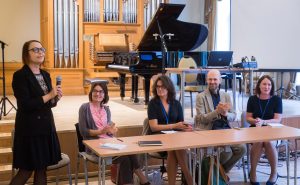
DIP steering committee
Keynote lectures and those lecture-recitals taking place at the Music Innovation Studies Centre were live broadcasted and are available on MiSC LMTA YouTube channel. All presentations from the event were filmed and will constitute a virtual archive of “Doctors in Performance” – online proceedings will be published on the basis of papers delivered at the conference. The photo gallery of the event may be found here.
Photos by Martynas Aleksa


